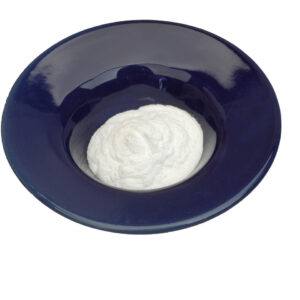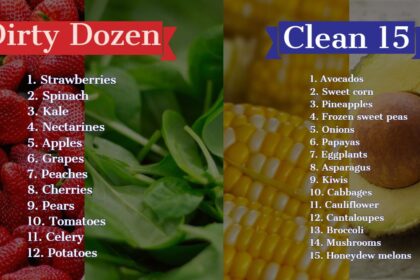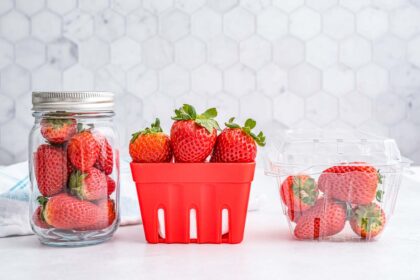Pesticides are widely used in agriculture to protect crops against pests and diseases. However, residues can remain on fruits and vegetables after harvesting, raising concerns about potential health risks. Washing produce thoroughly at home can help remove some pesticide residues, but it may not eliminate all of them.
In a new study, scientists tested three different methods for removing pesticides from produce: tap water, a baking soda solution, and ozone gas. The results identified a clear winner that was chemical-free and remarkably inexpensive. The winning technique reduced pesticides by 80-100% on apples, peppers, strawberries, and tomatoes.
This article will discuss the experimental design and results of this recent study. The findings demonstrate a simple, effective, and affordable way to minimize exposure to pesticides from fresh produce. Implementing this method could provide a pragmatic approach for consumers wishing to reduce pesticides in their diets. The ease and low cost of this technique present an accessible option to improve food safety that could be broadly adopted.
The Quest for Clean Produce
Every year, the unveiling of the Environmental Working Group’s ‘Clean Fifteen’ and ‘Dirty Dozen’ lists provides valuable guidance for health-conscious shoppers seeking the cleanest possible produce.
The latest release continued the usual trend, except for a couple of common crops showing “less than one percent detectable pesticides,” even in non-organic forms.
Yet, the pesticide conundrum remains unsolved in the United States, especially with Bayer’s imminent acquisition of Monsanto. Despite increasing levels of glyphosate and other harmful chemicals in our environment, the silver lining is the resurgence of organic food and a multitude of strategies to limit your exposure to detrimental pesticides.
One effective strategy involves utilizing the highest quality DIY produce wash for your fruits and vegetables. A recent study from the University of Massachusetts discovered an unexpected winner that is inexpensive, simple, and efficient.
Study Insights: Baking Soda Outperforms Chlorine in Removing Pesticides From Produce
The research, issued in October 2017 in the Journal of Agricultural and Food Chemistry by a team of six scientists, evaluated three primary cleaning agents for produce: pure water, a bleach solution containing chlorine, and a solution of water and baking soda.
The research team used Organic Gala apples coated with the fungicide thiabendazole or the pesticide phosmet for testing purposes. The apples were then washed using one of the three solutions.
According to lead researcher Dr. Lili He, the study aimed to verify if “the factory level (of washing) is already effective” in removing these chemicals. Baking soda emerged as the undisputed champion due to its superior ability to expedite the degradation of pesticides compared to the other solutions.
The Remarkable Efficiency of Baking Soda in Cleaning Pesticides From Produce (And How to Utilize It)
The University of Wisconsin suggests that sodium bicarbonate (baking soda) has been recognized in the U.S. pharmacopoeia since 1848 as a safe and effective cleaning and healing substance. Its 99% purity, coupled with its natural chemical and physical properties, make it suitable for numerous household applications.
For effective removal of harmful toxins from your produce, a simple mixture of 1 tablespoon baking soda and 1.5 liters of water is all you need. This method outperforms both pure water and bleach solution.
To fully harness the benefits, the study advises soaking your Gala apples in the baking soda solution for at least eight minutes. This duration yielded “significantly reduced pesticide residue on the surface,” according to the researchers.
A more extended soak of 12-15 minutes leads to “virtually no pesticides left,” mirroring the results for avocados and sweet corn.
While opting for organic produce is still preferred for its soil-friendly farming practices and higher antioxidant and mineral content, remember to grab some baking soda when shopping for conventional produce.
Selecting the Best Baking Soda Brand
Mainstream baking soda brands can suffice for household uses and quick fixes, but it is advisable to choose a naturally mined brand over chemically extracted ones.
I recommend Starwest Botanicals Baking Soda due to its traditional mining method, which eliminates the need for chemical processes that are common with other brands.
Click Here To Check Out Starwest Botanicals Baking Soda
The brand offers a more natural alternative to conventional baking soda. They use water to extract the sodium bicarbonate, avoiding the use of chemicals entirely. This makes their products gluten-free, aluminum-free, and a truly natural option.
If baking soda isn’t your preferred choice, you might want to try a blend of lemon juice and white vinegar. It’s crucial to select organic vinegar when possible, as popular brands like Heinz often derive their products from genetically modified corn, which may have been doused with Roundup herbicides.
A convenient option is to use ACV powder, which can be mixed into water easily and is just as powerful.
Click Here To Try Starwest Botanicals Organic Apple Cider Vinegar Powder
Additional Tips for Cleaning Pesticides Off of Produce
- When washing produce with tough skins such as potatoes or cucumbers, use a vegetable brush to scrub the surface thoroughly.
- Leafy greens can be difficult to clean due to their many crevices. Submerging them in a bowl of cold water and swishing them around can help remove dirt and potential pesticide residues.
- Produce with soft skins, like tomatoes and grapes, should be rinsed under running water to avoid damage.
- Make sure to dry your produce thoroughly with a clean cloth or paper towel to further remove any remaining pesticides.
Don’t forget to wash produce that has a peel you don’t eat, such as bananas or oranges. The act of peeling can transfer pesticide residues to the edible part.
A 2012 study found that rinsing with tap water is more effective than using a vegetable cleaning solution for some types of produce. However, as shown in this article, a baking soda solution can be even more effective.
These tips should provide you with the knowledge you need to significantly reduce pesticide residue on your produce. The key is to remember that while organic is always a better choice for many reasons, it’s still crucial to clean all your produce effectively. Armed with this information, you’re ready to enjoy cleaner, safer fruits and vegetables.






